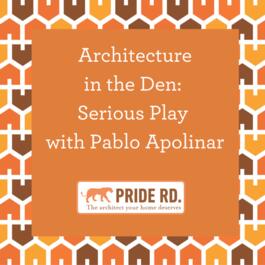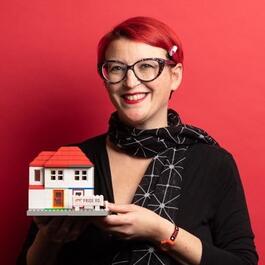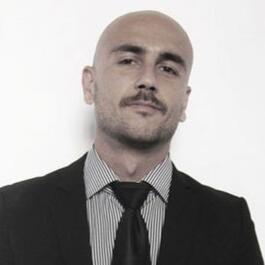
Architecture in the Den: Serious Play with Pablo Apolinar
Architecture in the Den: Serious Play with Pablo Apolinar aka the awesome Lego journey taken by two architects Lego is one of those toys that is ubiquitous in schools, early years settings and the homes of young children. The name itself derives from the Danish phrase leg godt which translates as ‘play-well’. And in the hands of a young Pablo Apolinar, an amazing journey began with these bricks, put simply Lego had an influence on his decision to become an architect. Tune in to hear host Lisa and Pablo discuss their Lego journeys, and explore how this particular form of spatial communication inspires them in their professional careers. For Lisa, Lego is an essential communication tool, she uses it to show her clients the different options available, for example, in roofs and extensions. It’s also a fun, quick and playful way to explain complex concepts. Pablo’s long-standing interest in social architecture can be reflected in the socialisation experienced by a group of kids building Lego together. Let’s see what these two architects can tell us – perhaps with a brick or two! Pride Road Franchise grew out of Founder Lisa Raynes’ refusal to accept that there was only one way for a woman to have an architecture career and a family life. She built her practice in the domestic sector, and then invested to turn her business into one that other ambitious architects wanting work/life balance can buy into. She’s had a seat on the RIBA Council (2015-18), been Chair of Women in Property NW and founded Manchester Curious, an urban architecture outreach festival. For Lisa a successful outcome is a happy client – and clear communication is an essential skill to ensure this. This means giving clients the information they need in the format that works best for them, whether in emails, zoom calls or Lego demos! Pablo Apolinar is very interested in social architecture, arts and creativity. He studied Architecture in the Polytechnic University of Valencia. After graduating in 2008, his Doctoral Thesis researched the concept of time in Architecture after Einstein. The architect works with space, light, beauty or proportion because they are familiar with them. However, this is not applicable to time. He obtained the highest qualification for his PhD. His academics were completed with a Ruta Quetzal grant, that builds communities overseas attached to the Secretariat of State for International Cooperation of Spain. This programme was declared of national interest by more than 30 countries, was endorsed by the European Union, and was declared a cultural programme of "Universal Interest" by UNESCO. In his architecture Pablo makes imaginative and considered contributions to the built environment through a socially-engaged design processes. The relationship between local communities, development and creative practice is a particular focus and so far, he’s been involved in charity projects. The first school Pablo built was on the border between Somalia and Ethiopia, and involved living and working on site for a year. Somalia is one of the world’s longest-running refugee crises and remains its worst refugee crisis. In Europe he started a University programme to integrate recent migrants in the local culture via architecture. Migration is caused by the actions of governments and citizens as a result of capitalism. We need to take seriously the role that cities have historically taken in empowering migrants.
From "The Pride Road Architects Podcast"




Comments
Add comment Feedback